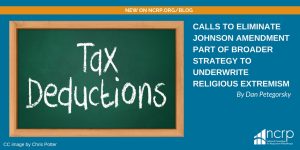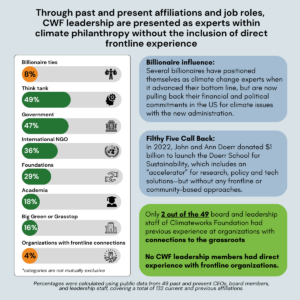In supporting foundations and nonprofits working for long-term, systemic change, one of NCRP’s greatest roadblocks is not the stringency of IRS regulations themselves, but the fear many foundations and their grantees have of running afoul of them. As a result, they too often operate under self-imposed restrictions that go well beyond those rules, hamstringing groups from being bold and effective advocates.
This type of caution is far more prevalent among liberal and “mainstream” funders than their conservative counterparts – so it’s especially ironic that calls to overturn the Johnson Amendment (which prohibits nonprofits whose donors receive tax deductions for their gifts from supporting or opposing candidates for public office) come precisely from groups that have deliberately walked not just up to but way past the legal lines.
Under the banner of fighting for “religious liberty” the Alliance Defending Freedom (ADF), which is designated as an anti-LGBT hate group by the Southern Poverty Law Center, has long sought to tear down the separation of church and state by pushing the exemption of religious institutions from a host of laws including the Johnson Amendment.
Among ADF’s largest supporters are foundations devoted to privatizing public resources such as the Edgar and Elsa Prince Foundation, run by Education Secretary Betsy DeVos’s family. The current debate over the Johnson Amendment is just one front in an ongoing battle. (Another major supporter is the M.J. Murdock Charitable Trust, whose eyebrow-raising support for a range of right-wing organizations we noted last spring.)
First, a reality check: Churches, congregations and a wide range of affiliated religious institutions are already among the least regulated and accountable nonprofits in the country. Unlike almost every other nonprofit organization that is exempt from federal taxation and benefits from deductibility of donations, religious institutions are not required to file tax returns with the IRS, which is also limited in its ability to audit them.
You wouldn’t know that by listening to the groups that form the vanguard of the Christian right, their funders and politicians who’ve curried favor with them to build their political power.
Instead, the issue has been drawn into a narrative of grievance and persecution that drives so much of the rhetoric about “religious freedom.” This narrative has been central to a series of political and legal victories that threaten to impose religious strictures and privilege in a host of areas, from civil and employment rights to access to health care, and now even immigration policy.
The irony here is that for decades right-wing political donors, foundations and pastors have flouted the law with virtual impunity. And starting in 2008 through its Pulpit Freedom Sunday, ADF began encouraging pastors to defy the Johnson Amendment, with more than 1,500 pastors participating in 2014, none of whom were sanctioned by the IRS, according to ADF itself, as noted by Frederick Clarkson of Political Research Associates (PRA).
The narrative of Christian persecution underlies a much broader attack: It’s the basis on which right-wing organizations have won significant legal victories exempting businesses from observing anti-discrimination laws, challenging access to birth control under the Affordable Care Act and more.
As defined by Rewire in its new legislative tracking site, “Religious Imposition laws cover a range of legislation designed to shield private individuals and businesses from complying with nondiscrimination laws and to affirmatively deny services such as employment, housing and reproductive health care based on a religious objection to that service.” We’re seeing a marked increase in the introduction of state-level bills designed to exempt both businesses and individuals from complying with anti-discrimination statues.
In an important 2016 piece, PRA’s Clarkson summarized the strategy as a “campaign to carve out arenas of public life where religious institutions, individuals and even businesses may evade civil rights and labor laws in the name of religious liberty” in alignment with a broader “antigovernment strategy … to restrict arenas where government can legally act.”
Most nonprofit sector coalitions and watchdogs have lined up solidly in opposition to Trump’s call to get rid of the Johnson Amendment. The Council on Foundations warns that “a repeal of the amendment would have far-reaching, and potentially devastating effects, on charities, foundations and nonprofits by allowing unlimited and tax deductible money to flow through them and into the political process.”
Citizens for Responsibility and Ethics in Washington (CREW) says the order would “favor religion, allowing the government to penalize some political viewpoints by nonprofit organizations while protecting the opposite viewpoints,” and “would create a massive loophole for dark money.”
NCRP shares those concerns, and we see this move in the context of a larger push to weaken the public sector and remove vital protections against discrimination that we’ve fought so long to win.
Update 3/6/2017: Since this post was published, NCRP has signed on to a letter urging Congress not to repeal or otherwise weaken the Jonhnson Amendment.
The letter is a collaborative effort of the Council on Foundations, BoardSource, the National Council of Nonprofits, the Forum of Regional Associations of Grantmakers and the National Human Services Assembly. NCRP agrees with the letter that the Johnson Amendment “protects the integrity and independence of charitable nonprofits and foundations,” and that without it the charitable sector would be exposed to the “rancor of partisan politics” and “ulterior partisan motives.”
NCRP will continue to monitor congressional efforts to undermine the Johnson Amendment and to speak out on behalf of its members and allies about the amendment’s vital value to the field.
 Dan Petegorsky is senior fellow and director of public policy at NCRP. Follow @NCRP on Twitter.
Dan Petegorsky is senior fellow and director of public policy at NCRP. Follow @NCRP on Twitter.
Image by Chris Potter, modified under Creative Commons license.
































































































































































































































































































































































































































